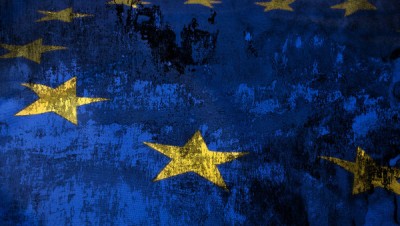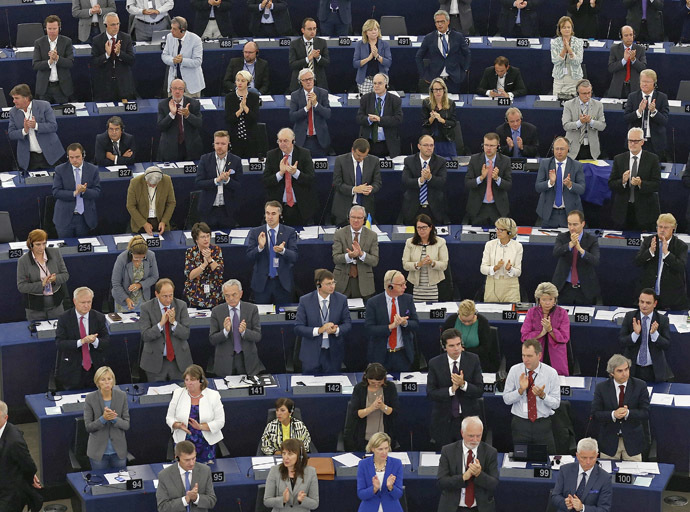The US-EU-Russia Sanctions Puzzle

Whatever Russia does, doubt does not even enter the equation. The answer is sanctions. So here we go again. The US Treasury-EU latest sanction package targets Russian banking, the energy industry and the defense industry.
The sanctions are mean. The sanctions are nasty. And there’s no euphemism to describe them; they amount to a declaration of economic war.
Sberbank, Russia’s largest won’t be able to access Western capital for long-term funding, including every kind of borrowing over 30 days. And the current 90-day lending bans affecting six other large Russian banks – a previous sanctions package – will also be reduced to 30 days.
On the energy front, what the US-EU want is to shut down new Russian exploration projects in Siberia and the Arctic, barring Western Big Oil from selling equipment and technology to offshore, deepwater or shale gas projects.
This means Exxon and Shell, for instance, are frozen in their operations with five top Russian oil/gas/pipeline companies: Gazprom, Gazprom Neft, Lukoil, Surgutneftegaz, and Rosneft.
No one ever lost money betting on the stupidity of the usual, unknown “senior US officials” – who are now spinning the latest sanction package is to force Moscow to “respect international law and state sovereignty.” A cursory examination of the historical record allows this paragraph to be accompanied by roaring laughter.
And then there’s the US Treasury’s Under Secretary for Terrorism and Financial Intelligence, David Cohen, who insists the package will further “isolate” Russia from the global financial system.
 Members of the European Parliament stand to applaud during a voting session on the EU-Ukraine Association agreement at the European Parliament in Strasbourg, September 16, 2014. (Reuters/Vincent Kessler)
Members of the European Parliament stand to applaud during a voting session on the EU-Ukraine Association agreement at the European Parliament in Strasbourg, September 16, 2014. (Reuters/Vincent Kessler)
The package was also described by Western corporate media as capable of “unnerving already jittery financial markets.” Well, they were not exactly “unnerved.” In Russia, the stocks of companies on the sanctions list went up. In the US, energy stocks went down. Short translation; the “unnerved” markets interpreted the latest package as yet another own goal by Washington and Brussels.
Splitting up Eurasia
As for Russia’s “isolation”, companies are barred from, in Washington-Wall Street newspeak, “important dollar-denominated funding sources.” Or, euphemistically, “Western capital.” This means the US dollar and the euro. Anyone following superimposed moves towards a multipolar world knows Russia does not need more US dollars and euro.
Moscow might use both to cross-purchase goods and services in the US and the EU. Yet these goods and services may be bought elsewhere around the world. For that, you don’t need “Western capital” – as Moscow is fast advancing the use of national currencies with other trade partners. The Atlanticist gang assumes Moscow needs goods and services from the US and the EU much more than the other way around. That’s a fallacy.
Russia can sell its abundant energy resources in any currency apart from US dollars and euro. Russia can buy all the clothing it needs from Asia and South America. On the electronics and high-tech front, most of it is made in China anyway.
Crucially, on the energy front, it would be no less than thrilling to watch the EU – which still does not even have a common energy policy – trying to come up with alternative suppliers. Azerbaijan, Turkmenistan and Qatar, for a number of complex reasons – ranging from insufficient gas to be committed, to an absence of pipelines – are out of the picture.
The Obama administration, for its part, simply won’t allow the EU to start importing energy from Iran like, virtually, tomorrow. Even with a now quite wobbly nuclear deal reached before the end of 2014 – presumably opening the way to an end to sanctions.
The “irrational” markets see what’s really goin’ on; they are not “irrational” but moved by profit derived from realpolitik.
And all this while Moscow has not even counterpunched. And that could be quite lethal – targeting EU exporters to Russia and even energy supplies from Russia. Then the EU will retaliate. And Russia will counter-counterpunch. That’s exactly what Washington wants: a trade/economic war ravaging and splitting up Eurasia.
 United States President Barack Obama (Reuters/Gary Cameron)
United States President Barack Obama (Reuters/Gary Cameron)About that $20 trillion…
On the political front, Ukraine and EU had initially agreed to “postpone the EU Association Agreement until the end of 2016.” You can’t make this stuff up; that’s exactly what Yanukovich did last November, as he knew Kiev could not allow itself to lose most of its certified trading with Russia in favor of a vague “free trade” with the EU. This agreement to “postpone” the agreement was in fact overseen by astonishing mediocrity and outgoing European Commission (EC) President Jose Manuel Barroso.
But then the European Parliament, during a plenary session in Strasbourg, hurried up to ratify Ukraine’sAssociation Agreement as President Petro Poroshenko simultaneously submitted it to the Ukrainian Parliament. This does not mean the agreement goes immediately into effect. Economic “integration”with the EU – a euphemism for a one-way invasion of Ukraine by EU products – will start only in January 2016. And there’s no way a crisis-hit EU will incorporate Ukraine anytime soon – or ever.
On Thursday, Poroshenko meets his master, US President Barack Obama, and addresses a joint session of the US Congress. Expect “evil empire” rhetoric to reach interstellar levels.
But it’s on Saturday in Berlin that the real thing starts unfolding; energy negotiations between Russia, the EU and Ukraine. Needless to say, Moscow holds all the key cards.
Washington’s humongous debt is reaching almost $20 trillion – and counting. With a monster crisis approaching like a tsunami from hell, no wonder Washington had to resort to the perfect diversionary tactic; the return of the “evil empire.” It’s the Marvel Comics school of politics all over again.
Russia has a huge surplus of foreign capital – and is able to weather the storm. Germany – the EU’s top economy – on the other hand, is already suffering. Growth is already at a negative 0.2%. This is the way the hysterical sanction wind is blowing – further derailing EU economies. And no one is betting the EU will have the balls to stand up to Washington. Not in vassal-infested Brussels.

